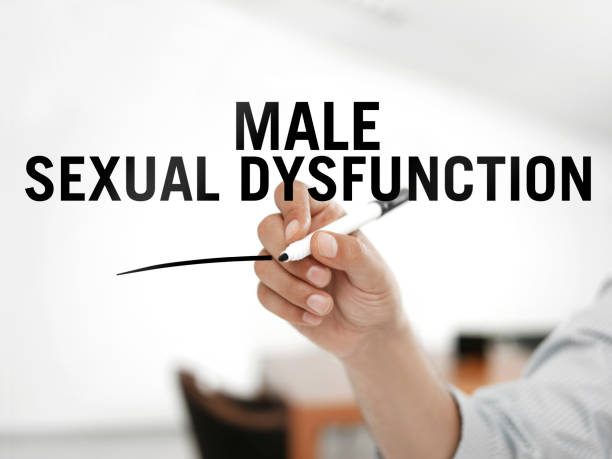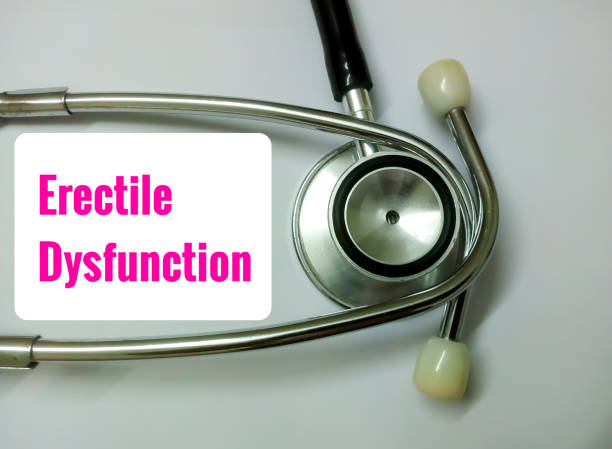Understanding the Psychological Effects of Erectile Dysfunction
Erectile dysfunction (ED) is a widespread condition that impacts millions of men around the world. While much attention is given to the physical causes, the emotional and mental effects are just as important. Struggling with ED can lead to stress, anxiety, and even depression, creating a cycle that worsens the condition. It can also take a toll on self-confidence and strain relationships, causing frustration and feelings of inadequacy. Understanding the psychological side of ED is key to finding effective ways to manage it. In this article, we’ll discuss the emotional challenges of ED and explore strategies to cope with its impact.
How Erectile Dysfunction Affects Mental Health
Anxiety and Performance Pressure
Many men with erectile dysfunction (ED) struggle with performance anxiety. The fear of not being able to achieve or maintain an erection can create a cycle where anxiety makes the condition worse. This often leads to avoiding intimacy, which can increase stress and tension in relationships.
Society’s expectations of masculinity add to the pressure. Many men believe they must always perform sexually, and when ED happens, they may feel like they are failing. These feelings can lead to frustration, low self-esteem, and even depression. Over time, this emotional burden can make it even harder to overcome ED, creating a vicious cycle of stress and sexual difficulties.
Understanding these psychological effects is the first step in breaking the cycle and finding ways to manage both ED and mental health concerns.anxiety can extend beyond the bedroom, affecting confidence in other areas of life.
Depression and Low Self-Esteem
Erectile dysfunction (ED) can make men feel inadequate or less masculine, leading to a loss of confidence. Over time, these feelings may develop into depression and low self-worth. Research shows that men with ED are more likely to experience depression compared to those without it (source).
Depression can also make ED worse, creating a difficult cycle. When someone feels hopeless or lacks motivation, they may avoid seeking help or making lifestyle changes that could improve their condition. This can lead to deeper emotional struggles, making it even harder to regain confidence and restore sexual function. Recognizing the connection between ED and mental health is essential for breaking this cycle and finding effective ways to cope.
Relationship Struggles
Sexual intimacy plays a vital role in maintaining a strong emotional connection in relationships. When erectile dysfunction (ED) occurs, it can lead to frustration, misunderstandings, and feelings of distance between partners. If left unaddressed, these issues may weaken the relationship over time. Open and honest communication is essential to preventing emotional strain and resentment.
Partners may misinterpret ED as a sign of lost attraction or rejection, which can lead to feelings of insecurity or frustration. This misunderstanding can create tension, causing emotional withdrawal on both sides. Seeking professional help, such as relationship counseling, can provide couples with tools to navigate these challenges. By working together, couples can rebuild trust, strengthen their bond, and restore intimacy in their relationship.
Social Withdrawal
Some men with erectile dysfunction (ED) may withdraw from social situations due to feelings of embarrassment or shame. They might avoid gatherings, stop engaging in hobbies, or distance themselves from friends and family. This isolation can make anxiety and depression worse, creating a cycle that is difficult to break.
Avoiding social interactions can lead to loneliness and a lack of emotional support. Friends and loved ones may not understand what the person is going through, making it even harder to reach out for help. Over time, this can deepen feelings of frustration and sadness. Seeking support from trusted friends, a partner, or a professional can help men regain confidence and improve both their mental well-being and social life.
Increased Stress Levels
Stress and erectile dysfunction (ED) are closely linked. High stress levels can make it harder to achieve or maintain an erection, while struggling with ED can create even more stress. This cycle can be frustrating and difficult to break.
Chronic stress affects hormone levels, including testosterone, which plays a key role in sexual health. It can also lead to physical issues like high blood pressure and heart disease, both of which increase the risk of ED. Additionally, stress can cause sleep problems, mood swings, and reduced energy levels, all of which impact overall well-being.
Finding healthy ways to manage stress—such as exercise, meditation, or therapy—can improve both mental health and sexual function. Taking proactive steps to reduce stress can help break the cycle and support better intimacy and confidence.

The Connection Between Erectile Dysfunction and Mental Health Disorders
Can ED Lead to Depression?
Yes, erectile dysfunction (ED) and depression are strongly connected. Men who experience frequent ED may feel hopeless, frustrated, or even ashamed. These emotions can lead to a loss of interest in activities they once enjoyed, further impacting their mental well-being. Seeking support from a mental health professional can provide valuable guidance and coping strategies.
Depression also affects key brain chemicals like dopamine and serotonin, which influence both mood and sexual function. When these neurotransmitters are imbalanced, sexual desire and performance can suffer. If left untreated, depression can lower libido even further, making ED worse. Addressing both ED and mental health concerns together can help improve overall well-being and restore confidence in intimate relationships.
How Anxiety Worsens Erectile Dysfunction
Anxiety triggers the body’s fight-or-flight response, causing a surge of stress hormones like cortisol. This reaction redirects blood flow away from non-essential functions, including the genitals, making it more difficult to achieve or maintain an erection. The more a man worries about performance, the greater the stress, creating a cycle that worsens erectile dysfunction (ED).
Men who experience frequent anxiety may also develop avoidance behaviors, choosing to abstain from sex rather than risk potential failure. This pattern can lead to frustration, relationship strain, and lower self-esteem. Over time, it may even increase feelings of isolation and depression.
Fortunately, anxiety-related ED can be managed with the right strategies. Mindfulness, therapy, deep breathing exercises, and relaxation techniques can help reduce stress and improve sexual performance. Addressing anxiety at its root can restore confidence and create a healthier, more fulfilling intimate life.
ED and Body Image Issues
Many men associate their self-worth with their ability to perform sexually. When erectile dysfunction (ED) occurs, it can lead to feelings of embarrassment, frustration, and self-doubt. This can create a cycle where confidence drops, making intimacy even more stressful.
For men who already struggle with body image issues, ED can reinforce negative self-perceptions. They may feel like their body is failing them, leading to lower self-esteem and reluctance to engage in intimacy. This can result in avoiding romantic situations altogether, which may cause emotional distance in relationships.
Addressing both ED and body image concerns is important for restoring confidence. Practicing self-compassion, focusing on overall health, and seeking support from a partner or therapist can help men feel more secure in their bodies and improve their intimate relationships.

Coping Strategies for the Psychological Effects of ED
Open Communication with Your Partner
Talking openly about erectile dysfunction (ED) can help reduce stress and strengthen your relationship. Share your feelings and fears with your partner instead of keeping them bottled up. Honest conversations can help both of you feel more supported and understood.
It’s also important to reassure your partner that ED is not a reflection of your attraction or love for them. Many partners may misinterpret ED as rejection, which can create unnecessary tension. By addressing these concerns together, you can build trust and find solutions as a team.
One helpful strategy is to schedule time for intimacy without pressure. Instead of focusing solely on performance, prioritize emotional connection and physical closeness. Exploring new ways to be intimate can help reduce anxiety and create a more relaxed, enjoyable experience for both partners.r than performance can help rebuild confidence and reduce stress.
Seek Professional Help
Seeking professional help can make a big difference in managing the emotional effects of erectile dysfunction (ED). A therapist or counselor can provide guidance on coping with feelings of frustration, embarrassment, or low self-esteem. Talking to a professional allows men to express their concerns in a safe space and develop strategies to improve their mental well-being.
Sex therapy can be especially beneficial for both individuals and couples. It helps address concerns about intimacy, rebuild confidence, and strengthen relationships. A trained sex therapist can offer techniques to reduce anxiety and improve communication between partners.
Cognitive-behavioral therapy (CBT) is another effective approach, particularly for men struggling with performance anxiety. CBT helps identify negative thought patterns that contribute to stress and replaces them with healthier perspectives. By changing these thoughts, men can break the cycle of anxiety and regain confidence in their sexual health.
Lifestyle Changes for Mental and Physical Health
Making healthy lifestyle choices can improve both mental well-being and sexual health. Simple changes to daily habits can help reduce stress, boost confidence, and improve erectile function over time.
- Exercise regularly – Physical activity improves blood circulation, supports heart health, and increases testosterone levels, which play a key role in sexual function. Exercise also releases endorphins, which can reduce stress and improve mood.
- Eat a balanced diet – A heart-healthy diet rich in lean proteins, whole grains, fruits, and vegetables can support overall well-being. Foods high in antioxidants, omega-3 fatty acids, and nitric oxide—such as leafy greens, nuts, and fish—can promote better blood flow and erectile function.
- Practice stress-relief techniques – Managing stress is essential for both mental and physical health. Techniques like meditation, deep breathing, and yoga can lower anxiety, helping to break the cycle of stress-related ED.
By making these lifestyle changes, men can support their mental health, improve their energy levels, and enhance their overall sexual function.
Medication and Treatment Options
There are several medical treatments available for erectile dysfunction (ED), but it’s important to find the right option based on individual needs. Talking to a doctor can help determine the best course of action.
- Prescription medications – Medications like sildenafil (Viagra) and tadalafil (Cialis) work by increasing blood flow to the penis, making it easier to achieve and maintain an erection. These medications can be highly effective, but they do not address the emotional or psychological effects of ED.
- Testosterone therapy – For men with low testosterone levels, hormone therapy may help improve libido and erectile function. A doctor can run tests to determine if this treatment is appropriate.
- Vacuum devices – A vacuum erection device (VED) is a non-invasive option that uses suction to draw blood into the penis, creating an erection. This can be a helpful alternative for men who cannot take medication.
While medical treatments can improve erectile function, addressing psychological concerns alongside physical treatment is essential. Combining medication with therapy, lifestyle changes, or stress management techniques can lead to better long-term results.
Challenge Negative Thoughts
Negative thinking can make erectile dysfunction (ED) feel even more overwhelming. Changing the way you think about ED can help reduce stress and improve confidence. Instead of focusing on self-doubt, try replacing self-defeating beliefs with positive affirmations.
- Reframe your thoughts – Remind yourself that ED is a medical condition, not a personal failure. Many men experience it at some point, and it does not define your worth or masculinity.
- Use journaling for self-reflection – Writing down your thoughts can help process emotions and recognize patterns of negative thinking. Identifying triggers for stress or anxiety can make it easier to address them.
- Practice self-compassion – Be kind to yourself. Struggling with ED is not a reflection of your value as a partner or individual. Self-acceptance and patience are key to overcoming emotional challenges.
By challenging negative thoughts and focusing on self-improvement, men can regain confidence and take positive steps toward better mental and sexual health.

When to Seek Professional Help
If erectile dysfunction (ED) is causing significant distress or affecting quality of life, seeking help from a healthcare provider is essential. ED can be linked to underlying health conditions such as heart disease, diabetes, or hormonal imbalances. A doctor can perform tests to identify any medical causes and recommend the best treatment options.
In addition to medical support, a mental health professional can help address the emotional toll of ED. Anxiety, depression, and relationship struggles often play a role in ED, and therapy can provide coping strategies to manage these challenges.
Men should not hesitate to talk to their doctor about ED. Many treatment options are available, and the sooner the issue is addressed, the sooner they can find effective solutions and regain confidence in their intimate relationships. Taking action is the first step toward both physical and emotional well-being.
Final Thoughts: Taking Control of Your Mental and Sexual Health
Erectile dysfunction (ED) is more than just a physical issue—it can have a significant impact on emotional and psychological well-being. However, the good news is that help is available. By addressing the mental effects of ED, seeking professional support, and making positive lifestyle changes, men can regain confidence and improve their overall health.
If you or someone you know has experienced the emotional challenges of ED, we encourage you to share your thoughts in the comments below. Your story could help others feel less alone and more empowered to seek solutions.
For more expert advice on men’s health, explore our other articles and take the next step toward a healthier, more fulfilling life!

